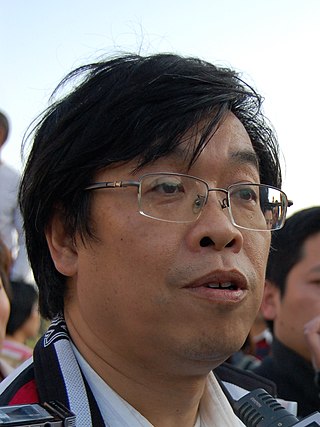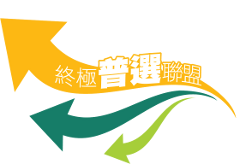
The Democratic Alliance for the Betterment and Progress of Hong Kong (DAB) is a pro-Beijing political party registered since 1992 in Hong Kong. Chaired by Gary Chan and holding 13 Legislative Council seats, it is currently the largest party in the legislature and in terms of membership, far ahead of other parties. It has been a key supporting force to the SAR administration and the central government's policies on Hong Kong.

The Greens is a political party in Poland.

The United Democrats of Hong Kong was the first political party in Hong Kong. Founded in 1990, the short-lived party was the united front of the liberal democracy forces in preparation of the 1991 first ever direct election for the Legislative Council of Hong Kong. The party won a landslide victory by sweeping 12 of the 18 directly elected seats in the election which shook the political landscape of Hong Kong. In 1994 it was merged with another pro-democracy party Meeting Point to form the contemporary Democratic Party.

The pro-democracy camp, also known as the pan-democracy camp, is a political alignment in Hong Kong that supports increased democracy, namely the universal suffrage of the Chief Executive and the Legislative Council as given by the Basic Law under the "One Country, Two Systems" framework.

The Hong Kong Civic Association is one of the longest-existing political organisations in Hong Kong. Established in 1954 by a group of teachers, professionals and businessmen, the Civic Association was one of the two semi-political parties to participate in the Urban Council elections since the 1950s, alongside Reform Club of Hong Kong. They were the only two organisations closest to the opposition parties dominated in the post-war colonial period before the expansion of the franchise in the 1980s.
The united front is a strategy directed by the Chinese Communist Party (CCP) and the Government of China to consolidate their control over Hong Kong. To accomplish this aim, a number of different strategies have been used since the 1980s. Today the control is mostly done through manipulation of local elections.

António Ng Kuok Cheong was a member in the Macau Legislative Assembly, returned by direct election. He was the founding chairman of the pro-democratic political party New Macau Association. He is also the leader of the political pressure group Union for Democracy Development. Ng has been a major figure in the Macau democracy movement and is one of the three pro-democratic legislators in the Assembly.

The 2000 Hong Kong Legislative Council election was held on 10 September 2000 for members of the 2nd Legislative Council (LegCo) of the Hong Kong Special Administrative Region (HKSAR). The election returned 24 members from directly elected geographical constituencies, 6 seats from the Election Committee constituency and 30 members from functional constituencies, of which 9 uncontested.

The pro-Beijing camp, pro-establishment camp or pro-China camp is a political alignment in Hong Kong which generally supports the policies of the Beijing central government and the Chinese Communist Party (CCP) towards Hong Kong. The term "pro-establishment camp" is regularly in use to label the broader segment of the Hong Kong political arena which has the closer relationship with the establishment, namely the governments of the People's Republic of China (PRC) and the Hong Kong Special Administrative Region (HKSAR). Pro-Beijing politicians are labeled "patriots" by pro-Beijing media and "loyalists" by the rival pro-democracy camp.

The Alliance for Universal Suffrage was a coalition formed by 11 pro-democracy parties and groups in Hong Kong. The Convenor of the Alliance was Fung Wai-wah.

The 2011 Election Committee subsector elections took place between 7:30 am and 10:30 pm on 11 December 2011. The Election Committee sub-sector elections are a part of the contemporary political process of Hong Kong. The election's purpose is to decide the 1,044 members of the Election Committee of Hong Kong. The resulting Election Committee is then responsible for electing the Chief Executive of Hong Kong Special Administrative Region (SAR) in the 2012 Election.
Legislative elections were held in Macau on 15 September 2013 according to the provisions of the Basic Law of Macau. This election was the first of its kind succeeding the reform of the Legislative Assembly that created four new seats; two new geographical constituency seats and two new functional constituency seats. Out of a total of 33 seats, 14 were elected by universal suffrage under the highest averages method, while 12 were voted on from the Functional constituency, and 7 from nomination by the Chief Executive.
The pro-democracy camp or pan-democracy camp is a political alignment of politicians and social activists in Macau who support increased democracy and may work together in areas of common interest or by not fielding candidates against one another in elections.
The pro-Beijing camp, pro-establishment camp or pro-China camp is a political alignment in Macau which supports the policies and views of the Chinese government and the Chinese Communist Party before and after the handover of Macau on 20 December 1999. The term can be used to identify politicians, political parties and individuals. Their rivals are the pro-democracy camp.

Future of Russia – New Names was a political alliance in Russia.
This page is based on this
Wikipedia article Text is available under the
CC BY-SA 4.0 license; additional terms may apply.
Images, videos and audio are available under their respective licenses.









